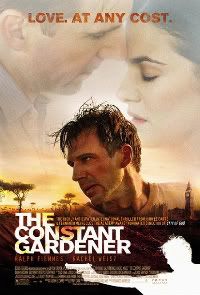Reviewed on September 13, 2005
 It wasn’t the best week for me to see The Constant Gardener. Hurricane Katrina had washed away New Orleans and I had heard some bad health news from a couple of friends. But Friday night is still a great night to see a movie, and Ralph Fiennes movies get high priority in my house, so I went, looking forward to escaping the realities of the horrible world for a couple of hours.
It wasn’t the best week for me to see The Constant Gardener. Hurricane Katrina had washed away New Orleans and I had heard some bad health news from a couple of friends. But Friday night is still a great night to see a movie, and Ralph Fiennes movies get high priority in my house, so I went, looking forward to escaping the realities of the horrible world for a couple of hours.
Bad idea.
Not that the film is bad. Far from it. But it is a serious film. Very serious. And very real. Being a vegetarian but not a vegan, I’m very aware of the “don’t think about it” nature of the world—meaning that if I really thought about how dairy products and eggs are produced, I wouldn’t go near them, since I’ve already gone halfway towards enlightenment, you know? Well, the realities of the world are very much like that. There’s only so much we feel we can change, so we insulate ourselves, and we try our best to control our intake of information so as to not feel overwhelmed by the sheer vastness of it all. If we really thought about all the poverty, violence and injustice that goes on in the world, I swear we’d be paralyzed. Instead we choose to live in our cocoons, peeking out once in a while to read the sanitized news or donate to a cause. Until it hits home, it seems a faraway problem, too much for one person to do anything about.
Well, I was happily living in my cocoon when I plunked down my $10 to see The Constant Gardener. With the images from Hurricane Katrina still swirling in my head, I munched on my popcorn and watched the previews of coming attractions, unaware that the outside world would follow me into the theatre.
The Constant Gardener is fiction, but it is based in fact. The basic plot is a thriller-slash-mystery-slash romance and it is truly an adult film in every sense of the word. Set in Africa, the film stars Rachel Weisz as the wife of a British diplomat (played by the incomparable Ralph Fiennes) who sets upon a personal crusade to bring justice to the African people who are being unfairly and unwittingly used by a corrupt pharmaceutical company. The details of the story are far too complicated to detail here, and I wouldn’t want to ruin it for you, but let’s just say that the plight of the African people is fully examined and makes you wish you had listened closer when Bono was speaking about it for the past ten years. The vivid depiction of the country (it was filmed in Africa) and its people and their plight is sobering and heartbreaking. For me, in the mental and emotional state I was in, it was just too much. But that doesn’t mean I cannot appreciate the quality of the film that was made here.
Rachel Weisz and Ralph Fiennes are perfectly matched as the oddly-coupled pair who fall in love, despite their obvious differences (one is an emotional activist, the other a passive diplomat). When Weisz’s character dies early in the film, Fiennes’ character sets about to find out who and what was at the root of her apparent murder, only to find an unraveling sea of corruption, deceit and betrayal that ends up putting his own life in danger.
Captivating, thrilling, exciting, depressing, heartbreaking and overwhelming all at once, The Constant Gardener is an extremely thoughtful film made for the thoughtful moviegoer. It’s an unusual time of the year for such serious fare, but let’s hope it can stand out among all the stupid summer comedies and find its audience. While it is a bit on the heavy side, it does deserve to be seen—and will be appreciated.
My rating: ***= Worth paying full price in the theatre
